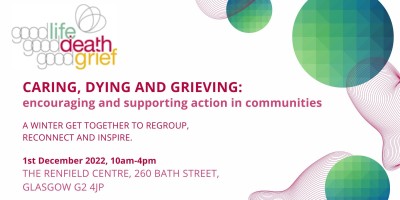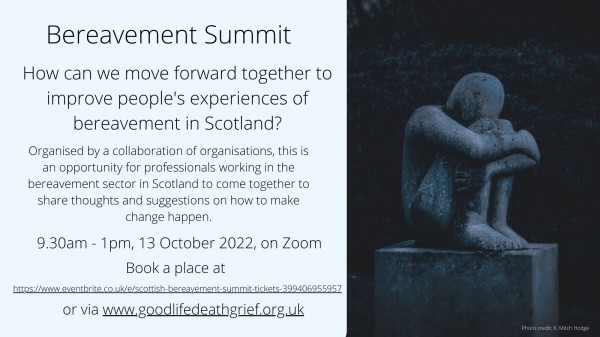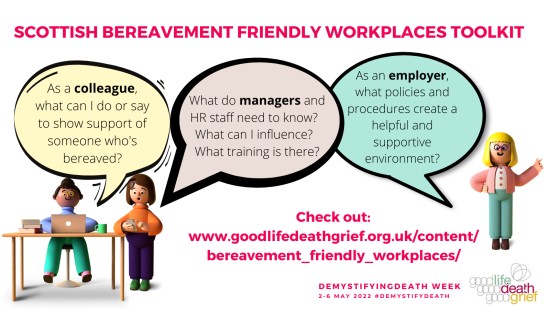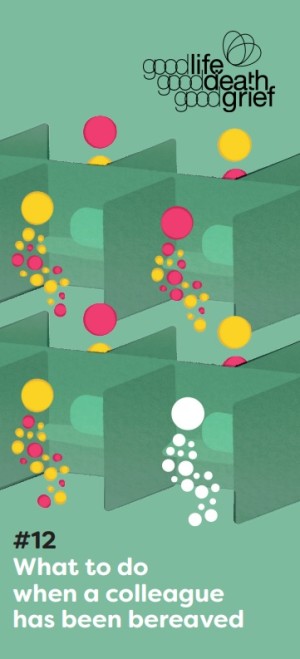News
winter get-together

Share your work and join us exploring how to give people in Scotland opportunities, skills, and the confidence to support people who are caring, dying or grieving.
Caring, Dying, Grieving: encouraging and supporting action in communities will take place on 1 December 2022, at the Renfield Centre in Glasgow.
Check out the programme and book here: Caring, dying and grieving: encouraging and supporting action in communities
It is a chance to learn more about these issues, to share the work you’re doing, and explore the current challenges, potential solutions and opportunities for collaboration that exist within Scotland.
what will the event cover?
The day will explore:
- public health palliative care
- compassionate communities
- planning ahead for ill health and death
- death education and bereavement support in schools
- bereavement-friendly workplaces
- public education about death and dying
who should come?
The event is designed for anyone interested in this field, whether professionally, personally or in a volunteer capacity. We're keen to welcome volunteers, community members, social care staff, nurses, doctors, funeral directors, death doulas, academics, policy workers, community development practitioners, service planners/managers and more.
format
The day will include a mix of plenary sessions, interactive smaller groups, and opportunities for stakeholders to share their work. More information about the day is available here: Caring, dying and grieving: encouraging and supporting community action.
Share your work
exhibitors
The Renfield Centre is a great space for stalls and exhibitions, and we have a limited number of tables available for organisations and groups to showcase their work.
If you would like to host one of these tables (free of charge), please email a short explanation of your organsation/group and the work you'd like to bring to samara@palliativecarescotland.org.uk by Thursday 27 October.
open-mic slots for speakers
One of the plenary sessions will be an 'open-mic quick-fire' session on topics chosen and delivered by delegates.
Are you doing great work that you'd like to share? Or is there something that you'd like other people to get involved in? If so, we'd encourage you to apply for one of these slots.
Email samara@palliativecarescotland.org.uk by 27th October, with a brief description of what you’d like to talk about. Each speaker will get five minutes to speak. There is limited time but we will endeavour to showcase as much work as possible.
bring a session
There is space at the venue for some additional short break-out sessions to be held from 9.40am-10.20am. For example, these could be used to provide an open information session on a particular topic, or to hold a private group meeting.
If you would like to apply to use one of these breakout spaces, please email samara@palliativecarescotland.org.uk by 27 October 2022.
Bereavement Summit - Outputs

The Scottish Bereavement Summit took place online on 13th October 2022. The event was a developed by a wide collaborative of organisations involved in bereavement support. The purpose of Summit was to consider ‘what next?’ – how can we move forward together to improve people's of bereavement in Scotland?
Thanks to all organisers, presenters, and delegates who helped make the Bereavement Summit such a success.
Insights from Bereaved People slideshow (includes audio)
Pre-Summit Questionnaire Survey Summary
Presentation Slides: Sally Paul and Nina Vaswani - "Prevalence, Impact and the Need to Take Action".
Discussion Groups Padlet (live)
The full recording of the plenary sessions can be viewed here.
Video timings guide:
- 00:00 - Mark Hazelwood: Welcome and outline of events.
- 07:30 - Donna Hastings: Introducing "Insights from Bereaved People" slideshow.
- 12:20 - Donna Hastings: Presenting "Insights from Delegates" survey summary.
- 21:00 - Sally Paul and Nina Vaswani: Presenting on "Prevalence, Impact and the Need to Take Action",
- 40:00 - Five short presentations on recent reports and their recommendations:
- 41:00 - Donald Macaskill on the Report of the UK Commission on Bereavement.
- 46:00 - Denisha Killoh on the National Childhood Bereavement Project Report.
- 52:30 - Claire Donaghy on Grief Encounters: Experiences of Bereavement Support in Later Life, Independent Age.
- 59:00 - Nina Huszarik on A better route through grief: support for people facing grief across the UK, Sue Ryder.
- 1:05:00 - Rebecca Patterson on Every Story’s Ending, Scottish Partnership for Palliative Care.
- 1:10:00 - Jennifer Somerville: Presenting an overview of some of the context and work currently underway in Scotland aiming to improve people’s experiences of bereavement.
- 1:20:00 - Mark Hazelwood: Presenting the delegate survey summary on "Next Steps" and concluding.
Image credit: Good Life. Good Death, Good Grief
To Absent Friends small grants scheme launched
We have now launched our small grants scheme for this year's To Absent Friends festival of storytelling and remembrance, which runs from 1-7 November 2022.
The scheme is to support small organisations to undertake local activities that provide public opportunities for storytelling and/or remembrance of people who have died.
Full details are available here.
Scottish Bereavement Summit

A Scottish Bereavement Summit will take place on 13 October 2021.
The event aims to bring together professionals working across the bereavement sector in Scotland to focus on ‘what next?’ – how can we move forward together to improve people's of bereavement in Scotland?
The event is being organised collaboratively by people and organisations from across the bereavement sector in Scotland.
The aims of the Bereavement Summit are to:
- explore key issues and potential ways forward for improving experiences of bereavement in Scotland, in the context of the publication of the Report of the UK Commission on Bereavement (due to be published on 12th September)
- give a platform to a diversity of voices working in the bereavement sector in Scotland.
- discuss the development of a strategic approach to improving bereavement support in Scotland.
For more information and to book a place, visit the Eventbrite website: https://www.eventbrite.co.uk/e/scottish-bereavement-summit-tickets-399406955957

New bereavement resources for workplaces

A new collection of resources has been launched this week to make workplaces better for people who are grieving.
The new Bereavement Charter Mark will recognise employers who support bereaved staff. It is accompanied by a Bereavement-Friendly Workplaces Toolkit providing tips and advice on how employers, managers and colleagues can support people who are grieving.
“Losing someone we love is the hardest thing many of us have to go through, and the pandemic has made life even more difficult for people who are bereaved.” Says Rebecca Patterson, Director of Good Life, Good Death, Good Grief. “No-one can take away someone’s grief, but employers have the power to make someone’s life a little better or a lot worse.”

To gain the new Bereavement Charter Mark, employers must agree to take some simple steps towards creating a supportive environment for people who are bereaved, for example educating staff about bereavement, or creating a local bereavement policy.
“I was worried about how I would cope. “ says Clare, who was apprehensive about returning to work after her Mum died. “My line manager was just brilliant. It was a case of ‘do what you can, when you can, if you can’. I can’t begin to tell you the relief this gave me. But other people at work said and did some really insensitive things that made me feel terrible. Hopefully these new resources will help other people facing the same situation as me.”
The new resources were produced by the Scottish Bereavement Charter Group, and Good Life, Good Death, Good Grief, a charity initiative working to make Scotland a place where everyone knows how to help when someone is caring, dying or grieving. The resources include:
From Good Life, Good Death, Good Grief and the Scottish Partnership for Palliative Care:
Scottish Bereavement-Friendly Workplaces Toolkit
This online toolkit is designed for people who want to make their workplace a supportive place for people who have been bereaved. It includes information for colleagues, managers and employers, as well as for people returning to work after a bereavement themselves. The toolkit includes links to training, resources, films, good practice guidance and bereavemetn support organisations.
What to do when a colleague has been bereaved
This leaflet gives some tips on the kind of things that a colleague can say or do to show support when someone is bereaved.
This checklist shows the various ways that an employer can create a supportive environment for bereaved staff.
From the Scottish Bereavement Charter Group:
Bereavement Charter Mark for Employers in Scotland
An employer can demonstrate that their organisation is proactively working to support bereaved employees by displaying the Bereavement Charter Mark on their website or within their buildings. Having the charter mark on your website demonstrates that you are working to make your community a place where people who are bereaved feel supported by the people around them.
Employer's Guide to the Bereavement Charter
The Guide introduces the Bereavement Charter for Adults and Children in Scotland, and explains how employers can demonstrate their support for the Charter.
This film introduces the Bereavement Charter for Adults and Children in Scotland, and suggests ways that everyone can help create a Scotland where people are supported when they're grieving.
“Becoming a bereavement-friendly workplace doesn’t have to be expensive - a lot of it is about flexibility, sensitivity and good communication.” Says Donald Macaskill, Chief Executive of Scottish Care.
“The Charter Mark and Toolkit help employers to see how simple actions by colleagues and managers can make a big difference to people who are living with grief.”
The new resources have been tested out in Inverclyde, with positive results.
“At CVS Inverclyde we’ve been working towards achieving the new Bereavement Charter Mark, and it has been an incredibly positive experience for all involved.’ says Alison Bunce of Inverclyde Cares. “It has been a great opportunity to bring colleagues together and talk through what we want to do to support each other through the difficult times that can come with bereavement.”
The new resources are being launched as part of ‘Demystifying Death Week’ which runs from 2-6 May. Demystifying Death Week is about shining a light on death, dying and bereavement in Scotland.
“People usually want to do the right thing when someone they know is caring, dying or grieving. But often they can feel awkward offering help, or worry about making things worse.” says Mark Hazelwood, Chief Executive of the Scottish Partnership for Palliative Care.
“Demystifying death week, and the new Bereavement Charter Mark and Workplaces Toolkit, are about giving people knowledge, skills and opportunities to plan and support each other through death, dying, loss and care.”
The new resources can be accessed at: https://www.goodlifedeathgrief.org.uk/about-workplace/